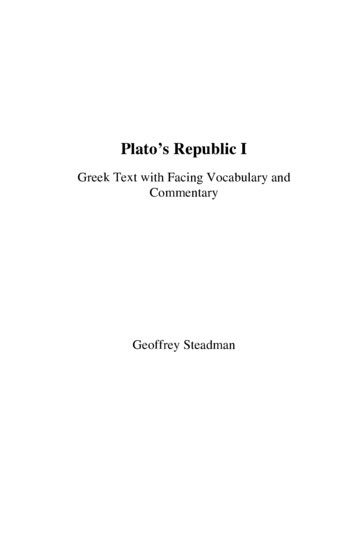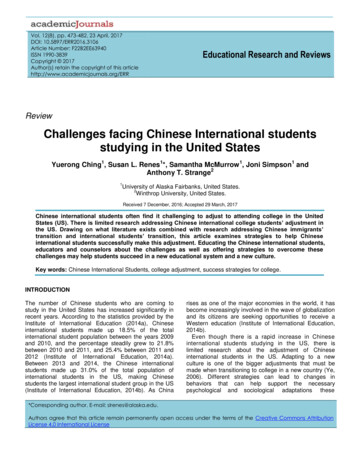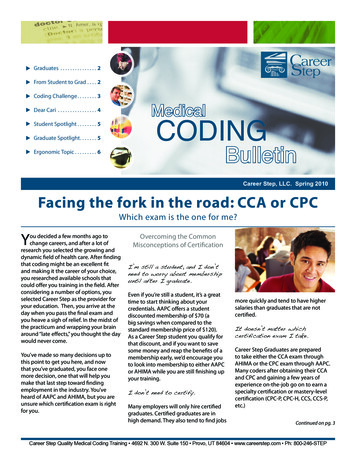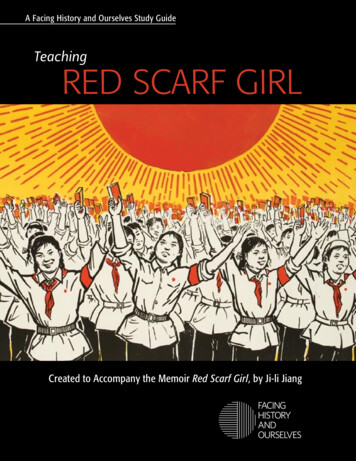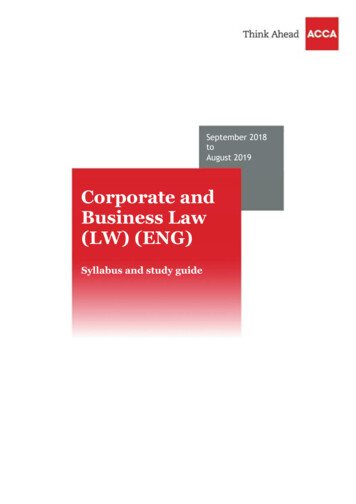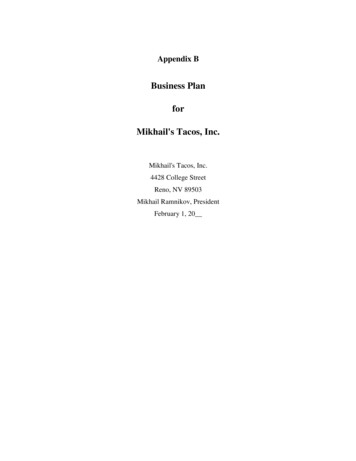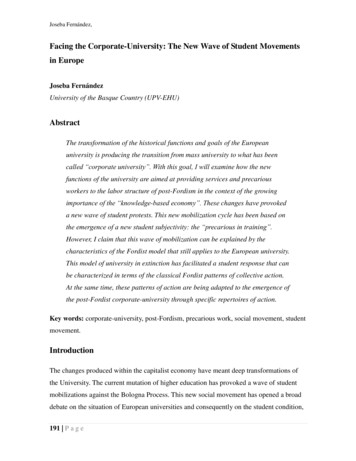
Transcription
Joseba Fernández,Facing the Corporate-University: The New Wave of Student Movementsin EuropeJoseba FernándezUniversity of the Basque Country (UPV-EHU)AbstractThe transformation of the historical functions and goals of the Europeanuniversity is producing the transition from mass university to what has beencalled “corporate university”. With this goal, I will examine how the newfunctions of the university are aimed at providing services and precariousworkers to the labor structure of post-Fordism in the context of the growingimportance of the “knowledge-based economy”. These changes have provokeda new wave of student protests. This new mobilization cycle has been based onthe emergence of a new student subjectivity: the “precarious in training”.However, I claim that this wave of mobilization can be explained by thecharacteristics of the Fordist model that still applies to the European university.This model of university in extinction has facilitated a student response that canbe characterized in terms of the classical Fordist patterns of collective action.At the same time, these patterns of action are being adapted to the emergence ofthe post-Fordist corporate-university through specific repertoires of action.Key words: corporate-university, post-Fordism, precarious work, social movement, studentmovement.IntroductionThe changes produced within the capitalist economy have meant deep transformations ofthe University. The current mutation of higher education has provoked a wave of studentmobilizations against the Bologna Process. This new social movement has opened a broaddebate on the situation of European universities and consequently on the student condition,191 P a g e
Facing the Corporate-University: The New Wave of Student Movements in Europewhich is very different from how it was in previous student cycles of mobilization (mainlythe one of 1968).In this paper I will analyze how the transformation of the historical functions and goals ofthe European university is producing the transition from mass university to what has beencalled “corporate university” (Sevilla: 2010). I claim that this transition shows remarkableparallelisms with the Fordism-Post-Fordism evolution in industrial relations. With this aim,I will examine how the new functions of the university are aimed at providing services andprecarious workers to the labor structure of Post-Fordism. Furthermore, this mutation,mirroring the Anglo-Saxon model of university, has provoked huge student protests. Thenew student criticism has been mainly directed against the mercantilist orientation of theuniversity, but also against the assimilation of the university as a device of knowledgeproduction in the era of “flexible production” (Harvey:1993). This new mobilization cycleis claimed to be based in the emergence of a new student subjectivity: that of the“precarious in training” (Calella: 2008). However, I argue that this wave of mobilizationcan be explained by the characteristics of the Fordist model that still applies nowadays tothe European university.This model of university in extinction has facilitated a student response that can becharacterized in terms of classical Fordist patterns of collective action. At the same time,these patterns of action are being adapted to the emergence of the Post-Fordist corporateuniversity. From this perspective, the last cycle of student resistance appears to be thetwilight of the student protest inside the Fordist university, and anticipates, at the sametime, some elements on how the student struggles will be in the new context of theuniversity as a device of flexible production of knowledge.The Transformatiion of University: Towards a University in Service ofPost-FordismSince the “oil crisis” of 1973 and the later neoliberal reorientation of economy, capitalismhas experienced deep changes in its own nature and forms. These changes have alsoaffected the technical composition of work and the new ways for capital appreciation.Within this context, in the last years, some theorists have developed the idea of cognitive192 P a g e
Joseba Fernández,capitalismi to explain the new era of capitalism and the increasing importance of knowledge(and affects) for the capitalist accumulation. Most of these theorists belong to the postworkerist tradition (Negri, Virno, Fumagalli or Mezzadra, amongst others), and areinfluenced by the workerist emphasis on the ‘real subsumption’ of labor. In thissubsumption, the collective social intellectual productive ability is one of the main subjectsof exploitation, including the collective cognitive capability – what Marx referred to as the“General Intellect” in the Grundrisse fragment on machines. This idea leads the postworkerist theorists to suggest that since capitalism is based in the use of scientificknowledge, it can be considered as a cognitive process. According to these ideas, theproduction of knowledge plays a central role for the capitalist accumulation. Within thistheoretical framework, universities also become a strategic sector in the increasinglyimportant global market of knowledge.On the other hand, the deregulation of the labor market has led to a degradation of labor,specially for young people who, due to the current economic crisis, see how precariousnessis the present and the future context for their lives.Because of this transformation of labor, the transition from Fordism to Post-Fordism (frommaterial to inmaterial-cognitive capitalism) has not been immune to the University. In thecontext of enhancing knowledge as a basic strategy for accumulation, the University hasbecome a central institution in this transformation. In this sense, the deep transformation ofthe labor market and the changes produced inside the industrial organization (two of themain characteristics of Post-Fordism) have also reached the University. Moreover, in thegeneral context of the “knowledge based economyii”. In fact, knowledge production islocated in the heart of what is called the “new economy”, which is generating, amongstother things, a significant impact on universities. Thus, universities should in principleadapt themselves to these new demands and to a new situation of extreme competitivenesswhich forces them to produce mainly “profitable” knowledge.The pressure over every public service to be commodified has also affected university. And,of course, the University has also had to face the tensions derived from the generaltransition from Fordism to Post-Fordism. And it has also opened the chance for new studentstruggles.193 P a g e
Facing the Corporate-University: The New Wave of Student Movements in EuropeHow university adapts to Post-fordism: the importance of neoliberalismIn general terms, in what sense can we say that University has been adapted to the basicrequirements and logics of post-Fordism?According to Bousquet (2011:514), during the 1980's a new culture (namely administrativeculture) appeared in the universities, in direct relationship with the theories inspired in theTaylorist organization of labor. These theories also promoted a new paradigm in themanagement of corporations. In this way, the restructuring of the labor market, theimplementation of neoliberal policies oriented to reduce the public services, and theimplementation of concepts from the “new management in public administration” made thedeep mutation of universities possible. This mutation was accompanied by two parallelprocesses described by de Sousa Santos (2005:20): (1) a high reduction of publicinvestment in universities, and (2) the development of a global market of knowledge and ofthe university sector.As a result of these two processes, University, as a social institution, has gone through threedifferent crisis during the last two decades:1.- A crisis of hegemony, due to the increasing presence of other private institutionswith which it is necessary to be in competence.2.- A crisis of legitimacy due to the breakdown of previous basic consensus onuniversity's functions.3.- An institutional crisis, because of the increasing pressure to subject(ing)university to the criteria of productivity and efficiency.In the words of Sousa Santos (2005: 21), the combination of these processes and theeconomic crisis has caused the transition of university from a public service into a widerange appreciation of educative capitalism. In this context of “academic capitalism”(Slaughter and Rhoades: 2004) a new model of university emerges: the corporateuniversity. I claim that the main goal of this new corporate-university is to be directlyorientated to the post-Fordist and precarious labor market. I do agree with Calella (2008:72)194 P a g e
Joseba Fernández,when he claims that universities have become “public agencies for the precarisation oflabor.” And also, in this new context, University makes possible to corporations the“primitive accumulation” of knowledge. However, we should try to avoid to focus thesechanges in a deterministic way. In the current agonistic democracy, the project of universityis under struggle. As Sotiris (2012) claims:the turn towards the entrepreneurial University should not be seen ‘one-dimensionally’as the result of Universities being turned into private businesses, but as thecondensation of class strategies related to the imperatives of hegemony in a period ofcapitalist restructuring and deterioration of the balance of forces between capital andlabor. It does not mark a simple process of privatization but a more complextransformation of a hegemonic apparatus in line with the changes in bourgeois strategy,exemplified in the hegemony of neoliberalism.How mass-university becomes corporate-universityAfter the wave of struggles of 1968, a new way of capitalist domination replaced the threepillars of capitalism (namely, factory, school and family) (Zizek 2011: 166). In the case ofeducation, lifelong learning and flexible education is replacing the public universaleducation. Indeed, in the postmodern capitalism, the market has invaded new areas whichuntil then were considered as privileged functions of the State. Toscano (2011b: 260)reminds us how Vercellone describes the mass university (a consequence of the “thirtyglorious years” after World War II) as both the product and the site of the real subsumptionof labor that had characterized an expansive Fordism (through a “passive revolution”, inGramsci's words). Moreover, Toscano (2011b:261) explains howthe mass university is functional to the designs of both the state and private managersof this real subsumption, but at the same time it very rapidly generates a powerfulcriticism of those designs themselves not just in terms of the hiatuses between themodernizing project and its institutional reality (critique of authoritarianism and eliteselection), but as questioning of the control of labor-power itself (critique oftechnocracy, of the instrumentalisation of academic disciplines, of the relationshipbetween the university and the labor market). iiiThe transition towards the corporate-university seeks to make functional the highereducation to the new economy and the new social and technical composition of workers.This new corporate-university is oriented to respond to the demands of the post-Fordist195 P a g e
Facing the Corporate-University: The New Wave of Student Movements in Europelabor market, namely to teach students how to be flexible, precarious and available for anyjob. Actually, it is the whole system of university that has become a post-Fordist device. Inthis sense, there are some nuclear elements of the corporate-university that connect it withthe general post-Fordist re-organization of labor. According to Sevilla and Urbán (2008:64)some of these elements would be: The trend to have, annually, an amount of graduates in correspondence with thedominant class demands of intellectual work. An increasing association of university research projects to the needs ofmultinational corporations. The improvement of the techniques of fragmentation, partialization and hyperspecialization that facilitate the use of trained technicians. The growing importance of general skills instead of knowledge in order to trainflexible workers able to shift jobs very easily. The generalization of precarious material conditions of life for students, researchers,scholars and other university workers. In this sense, university itself becomes afactory of precariousness.According to these elements amongst others, this restructuring of higher education can bedefined as the “corporate welfare” university (Bousquet: 2008:5) or simply as theadaptation of the University to the requirements of the new way of organizing economy andthe work-world. Thus, University inserts within the overall device of "flexibleaccumulation" through the downgrading of the new workforce and the generalcommodification of university research. In this sense, university becomes an assembly linejust-in-time by means of the construction of two different channels in the students training:the degree and the post-degree.In a similar way, another fundamental issue to understand the current situation of theuniversity is the student (or educational) debtiv. One of the main characteristics of the newera of capitalism is its finanzialization, that is the quick transit from a real-material196 P a g e
Joseba Fernández,economy to another one based in a speculative-fictitious economy. The global growth of thestudent debt has become a new concern for students. The importance of this mechanism isexplained by two factors: firstly, as an insertion of higher education into the logics offinancialization of the economy, and secondly as a chance to open a new process of studentresistance (as we can see these days in several universities of the USv). Moreover, theproblem of the educational debt allows us to link the student struggles with a broader socialunrest. Indeed, as Williams argues (2010), the student debt is becomin
Key words: corporate-university, post-Fordism, precarious work, social movement, student movement. Introduction The changes produced within the capitalist economy have meant deep transformations of the University. The current mutation of higher education has provoked a wave of student mobilizations against the Bologna Process. This new social movement has opened a broad


